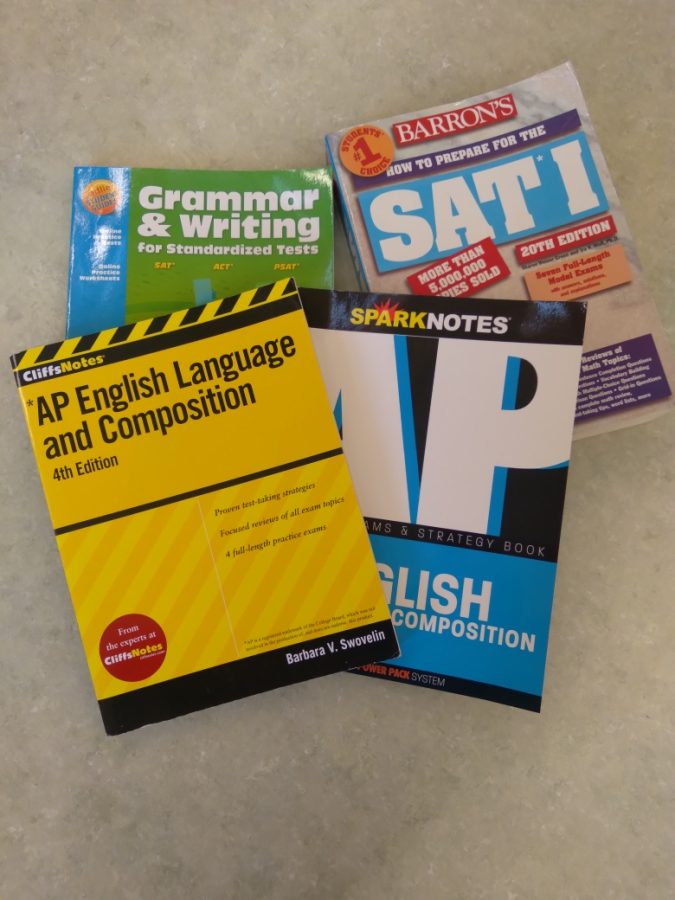Opinion: The Unseen Benefits of Standardized Testing

A variety of standardized test prep books are available on-line or in print form
In recent years, standardized testing as a determining factor in college admissions has come under great scrutiny. Critics of these tests, like the SAT and ACT, say test scores are mainly derivative of socioeconomic factors, and are not good indicators of college potential. In addition, requirements for test score submission have mostly disappeared, and the number of students taking these tests has been greatly reduced.
According to the Common Application, the organization behind a widely used application service, only 5% of colleges and universities required standardized tests as a requirement for undergraduate admission in the 2021-2022 admissions cycle, a drop from 55% of schools in 2019.
Also, between the years 2020 and 2021, the number of students taking the SAT and ACT dropped 30% and 22% respectively, as reported by USAFacts. While the increase in test-optional and test-blind admissions and decrease in students taking these tests has largely been prompted by test-center closings due to the COVID-19 pandemic, it appears that, due to mounting criticism of standardized testing, this trend will continue.
Janet Godwin, chief executive officer of ACT, said of the test-optional movement, “It’s here to stay. It’s the new normal.” With such a decline in the popularity of standardized tests as a determinant of academic excellence, as well as an unprecedented increase in schools dropping testing requirements, the merit of standardized testing has certainly been called into question. Are standardized tests, though, truly as ineffectual as they may seem?
As tests like the SAT and ACT become less important in the college admissions process, more emphasis is placed on other aspects of an applicant’s profile. According to collegedata.com, in a test-optional environment, parts of an application like grades, course rigor, extracurricular activities, and essays are of greater importance. These other parts of an application, though, are often closely tied to wealth and higher socioeconomic status.
In a 2021 study by Stanford University, the quality of college application essays was found to be strongly linked to the family income of a student, even more so than the SAT. Wealthy students are much more likely to have access to tutors and essay review services, giving them a significant leg up over students of lower socioeconomic status.
High grades and GPAs are similarly linked to wealth; as reported by U.S. News, affluent students are more likely to be enrolled in schools with advanced classes and grade inflation. While these other attributes of a student’s application can help contribute to a more holistic review process, and admittance to college should not depend on one test score, these attributes are certainly not the most objective measurements of the qualifications of an applicant, and are often strongly correlated with socioeconomic status.
Whereas grade inflation, access to tutoring, and advanced classes can greatly influence the numbers on a student’s transcript, tests like the SAT and ACT are truly standardized; a 4.0 from an elite private school could be vastly different from a 4.0 at a public school, but a 1600 SAT is a 1600, regardless of where it is taken.
While there are disparities in average standardized test scores based on socioeconomic status, and wealth can be closely linked with test performance, students from underrepresented groups can use test scores to help stand out in the college admissions process.
According to MIT admissions, standardized testing can be used to help identify disadvantaged students who would not normally be able to demonstrate preparedness for an institution without a test score. An underprivileged student may not have access to the advanced classes a wealthy student may have, but standardized tests like the SAT and ACT are widely available to students across the country. While standardized test scores are still greatly influenced by a student’s socioeconomic background, their consideration in college admissions offers a way for disadvantaged students to stand out.
Standardized testing is in no way a perfect system, and is certainly flawed in many aspects. In addition to the disparities in test scores caused by wealth, many students have test anxiety that can greatly interfere with their ability to take standardized exams, and the three-hour timed format simply isn’t the best way of displaying a student’s knowledge for many. But as the most objective, concrete metric of academic preparedness that exists in an application, standardized testing should remain a factor in the increasingly competitive and unpredictable world of college admissions.

Henry Telicki is part of the Class of 2023 at Oakmont. This is his third year writing for The Oakmonitor. Henry is a member of the cross-country team at...

Grace Hachey is Oakmont Class of 2025. She has been dancing since she was 4 years old, and has also done horseback riding for the past 8 years. In...














Declan • Oct 28, 2022 at 8:38 am
This is excellent literature.
Bryan • Oct 27, 2022 at 7:59 am
YEAH HENRY